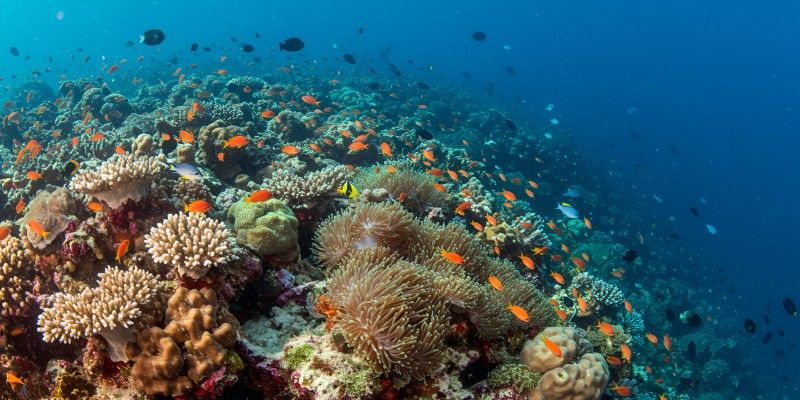
Researchers in Leeds have joined experts from across the world in warning that Earth is reaching the first of many climate tipping points that will cause catastrophic harm without urgent action.
The landmark Global Tipping Points report, launched on Monday, October 13, ahead of the COP30 summit in Brazil, sets out stark warnings that important worldwide ecosystems are already suffering major and potentially irreversible harm due to rising global temperatures.
Warm-water coral reefs – on which nearly a billion people and a quarter of all marine life depend – are passing their tipping point. Widespread dieback is taking place and – unless global warming is reversed – extensive reefs as we know them will be lost, although small refuges may survive and must be protected.
Professor Viktoria Spaiser from the University of Leeds School of Politics and International Studies (POLIS) is part of the team behind the report. She contributed expertise on community engagement, governance, the societal impacts of the collapse of major ocean currents and the Amazon, as well as positive social tipping points which could help turn the tide.

Professor Spaiser said: “Our hope is that Earth System Tipping Points will make it onto the agenda of COP30, as we believe taking Earth System Tipping Points into account may influence the direction of negotiations, accelerating mitigation action, but also shifting how adaptation and resilience is approached.
“We believe Earth System Tipping Points need to become an integral part of national climate risk assessments and need to be integrated in scenario modelling approaches. We hope to mobilise people and organisations across the world to take action around Earth System Tipping Points.”
With global warming set to breach 1.5°C, the report – by 160 scientists at 87 institutions in 23 countries – argues that countries must minimise temperature overshoot to avoid crossing more tipping points. Every fraction of a degree and every year spent above 1.5°C matters.
It warns that we are on the brink of more tipping points, with devastating risks for people and nature:
- Warm-water coral reefs are facing unprecedented mortality with repeated mass bleaching events. With current global warming at about 1.4°C, reefs are passing their thermal tipping point (central estimate 1.2°C, range 1-1.5°C). Even stabilising warming at 1.5°C, warm-water coral reefs are virtually certain (over 99% probability) to tip. This means coral reefs on any meaningful scale will be lost unless the global temperature returns to 1°C warming or below, although fragments of reef may be preserved with conservation efforts.
- Widespread dieback of the Amazon rainforest could be triggered sooner than previously thought, with the lower end of the estimated range now at 1.5°C. Over a hundred million people depend on the Amazon, but it could also be subject to positive social tipping points: inclusive local governance (including by Indigenous People), traditional knowledge, and targeted investments in conservation and restoration could boost the resilience of people and nature.
- The Atlantic Meridional Overturning Circulation (AMOC) – an important ocean current - is at risk of collapse below 2°C of global warming. This would bring harsher winters in north-west Europe, disrupt the West African and Indian Monsoons, and decrease agricultural yields in much of the world.
The researchers are working with Brazil’s COP30 Presidency to ensure that tipping points are on the agenda at the summit.
That warm-water coral reefs are passing their thermal tipping point is a tragedy for nature and the people that rely on them for food and income.
Professor Tim Lenton, from the Global Systems Institute at the University of Exeter, said: “We are rapidly approaching multiple Earth system tipping points that could transform our world, with devastating consequences for people and nature. This demands immediate, unprecedented action from leaders at COP30 and policymakers worldwide.
“In the two years since the first Global Tipping Points Report, there has been a radical global acceleration in some areas, including the uptake of solar power and electric vehicles. But we need to do more – and move faster – to seize positive tipping point opportunities. By doing so, we can drastically cut greenhouse gas emissions and tip the world away from catastrophic tipping points and towards a thriving, sustainable future.”
The report says that the nature of abrupt and irreversible Earth system tipping points mean that they pose a different type of threat to other environmental challenges, and that current policies and decision-making processes are not adequate to respond.
Global action must include accelerating emissions reductions and scaling up carbon removal to minimise temperature overshoot.
Positive tipping points
Action to trigger “positive tipping points” of self-propelling change – such as the rollout of green technologies – now offer the only credible route to a safe, just and sustainable future, the report says.
- Positive tipping points have already been crossed in solar PV and wind power globally, the adoption of electric vehicles, battery storage and heat pumps in leading markets. These transitions can be accelerated and once replaced, polluting technologies are unlikely to return because the new options are cheaper and better.
- Social attitudes are also tipping. Concern about climate change is growing globally – and even small numbers of people can tip the majority.
- Goods transport could see its own positive tipping point. COP30’s host nation, Brazil, has great potential for producing green steel, green hydrogen, and green ammonia – helping to kickstart these crucial technologies worldwide.
- Ecosystem restoration can tip degraded systems back to health, and shifts to more sustainable patterns of consumption and production can lead to tipping points in food and fibre supply chains that end deforestation and ecosystem conversion.
- We need to identify and trigger many more positive tipping points. Once identified, positive tipping is enabled by making the desired innovation the most affordable, accessible and/or attractive option. Governments, businesses, civil society and individuals all have a role to play.
Dr Mike Barrett, chief scientific advisor at WWF-UK and co-author of the report, added: “The findings of this report are incredibly alarming. That warm-water coral reefs are passing their thermal tipping point is a tragedy for nature and the people that rely on them for food and income. This grim situation must be a wake-up call that unless we act decisively now, we will also lose the Amazon rainforest, the ice sheets and vital ocean currents. In that scenario we would be looking at a truly catastrophic outcome for all humanity.
“As we head into the COP30 climate negotiations it’s vital that all parties grasp the gravity of the situation and the extent of what we all stand to lose if the climate and nature crises are not addressed. The solutions are within our reach. Countries must show the political bravery and leadership to work together and achieve them."
We hope to mobilise people and organisations across the world to take action around Earth System Tipping Points.
Professor Lenton added: “Only with a combination of decisive policy and civil society action can the world tip its trajectory from facing existential Earth system tipping point risks to seizing positive tipping point opportunities.”
Leeds academic Dr Danielle Young, also from POLIS, contributed to the report’s chapter on prevention with her research expertise on the governance of emerging climate intervention technologies.
Further information
- For more information or to arrange interviews please contact University of Leeds press officer Victoria Prest via email on pressoffice@leeds.ac.uk
- Further details of the Global Tipping Points report is available on the report’s website.
- Main image: Adobe Stock 1714642377